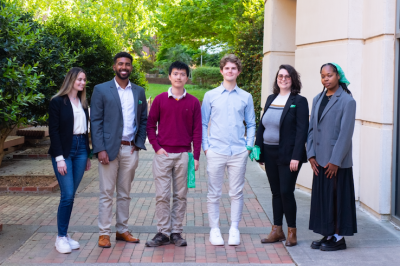UNC student-led team advances to global 'Map the System' finals
May 25, 2023

UNC’s “The Whole Student” team will advance to the Map the System global finals.
Mental health is an ever-growing challenge for college students, but one group of recent University of North Carolina at Chapel Hill students is tackling it through Map the System (MTS), a global competition focused on exploring the wider context of social and environmental issues. The competition enables students to explore an issue in-depth with the goal of finding levers for positive change.
The Whole Student – a team of six UNC students, four of whom attend the Gillings School of Global Public Health – has been selected as one of only 15 teams across the world to advance to the MTS global finals at the University of Oxford. The team used systems thinking to discover and understand the elements that contribute to mental health challenges amongst college students – including those at Carolina – by mapping forces that uphold this system at UNC.
The Whole Student is an interdisciplinary group of six student researchers:
- Aaron Carpenter, MPH, Gillings School*
- Lily Goldberg, Master of Public Health student, Gillings School
- Riley Harper, Bachelor of Science student
- Deborah Shoola, MPH, Gillings School*
- Rachel Smith, MPH, Gillings School*
- Hanqi Xiao, Bachelor of Science student
*Carpenter, Shoola and Smith graduated from the UNC Gillings School of Global Public Health on May 13 but will continue to work with the team in preparation for the July 3 global finals.
“Mental health is the perfect outlet for systems thinking due to its sheer mess and lack of coordination,” says Smith. “Mental health very much influences human behavior, which influences system behavior — it’s all quite compatible and interconnected. Systems thinking integrates mixed methods data seamlessly, so I’ve enjoyed implementing the qualitative aspect. Communicating nuanced information with a group of five other individuals from different backgrounds, lived experiences and working styles is a very dynamic experience that has fueled my growth, strength and flexibility.”
Through their research, the team discovered that many students report difficulty adjusting to the academic rigors of college life and developing new social networks. Once the COVID- 19 pandemic, many students experienced additional mental health challenges and faced barriers when trying to seek help. An overwhelming majority of Carolina students (96%) reported experiencing academic stress, followed by anxiety (87%), loneliness (68%) and depression (64%).
“We have been fortunate enough to be able to talk with several stakeholders across the student mental health landscape and have incorporated their voices and perspectives into much of our research,” says Shoola. “Listening and learning from the lived experiences of students has been really powerful; it’s also extremely necessary if you are doing any kind of participatory research or human-centered design work with communities.”
In mapping the mental health challenge for students, The Whole Student team identified multiple drivers and systemic root causes that contribute to the mental health ecosystem at UNC. The team analyzed this complex web of factors using five “sectors” that add up to make a whole student: individual student factors; student social networks; the classroom; culture, attitudes and beliefs; and barriers to accessing mental health support.
“As a public health professional, I find that systems thinking provides a more comprehensive understanding of public health challenges and comes with a set of tools that can be used when designing interventions for wicked social problems,” adds Shoola. “Tools such as the iceberg model and the root cause analysis allow you to dig deeper and help you to realize that a lot of problems are the result of deeply rooted structural determinants of health.”
The team created a system map that presents the problems, factors, variables and structures that contribute to the mental health crisis on college campuses, using UNC as a case study. The student researchers also explored the current solution landscape and inventoried gaps and levers of change. By participating in Map the System, they quickly learned how to work together toward a common goal while making the most of UNC resources and expert mentors.
Advancing to the July 3 global finals at the University of Oxford presents The Whole Student team with a tremendous opportunity to bring attention to mental health challenges among college students.
“I am looking forward to taking full advantage of the many opportunities to meet and learn from other student innovators, professors, business and policy leaders, and change makers from all over the world,” says Shoola. “I’m also excited to present our research, bringing attention to this issue on a global stage and contributing to a larger conversation surrounding mental health. Our project’s unique approach to addressing student mental health challenges make it a crucial case study that other universities can learn from.”
For more information about the Map the System program at UNC-Chapel Hill, visit the program page.
Contact the UNC Gillings School of Global Public Health communications team at sphcomm@unc.edu.
